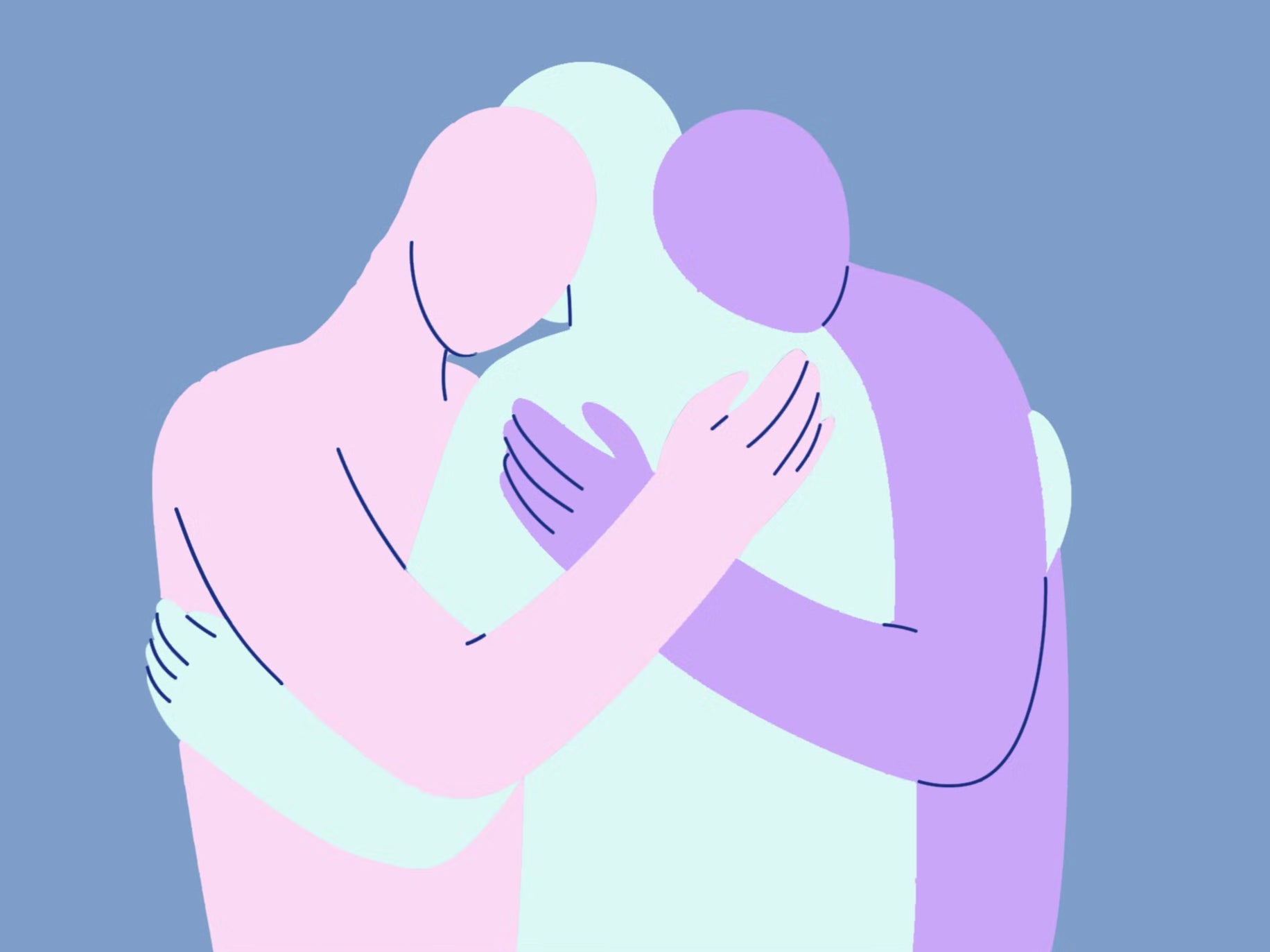Throuples aren’t immoral – and neither is my own ‘scandalous’ marriage
Why should we think it shocking for someone to love multiple others? We don’t restrict any other relationship to a binary, writes Andrew Solomon


Your support helps us to tell the story
From reproductive rights to climate change to Big Tech, The Independent is on the ground when the story is developing. Whether it's investigating the financials of Elon Musk's pro-Trump PAC or producing our latest documentary, 'The A Word', which shines a light on the American women fighting for reproductive rights, we know how important it is to parse out the facts from the messaging.
At such a critical moment in US history, we need reporters on the ground. Your donation allows us to keep sending journalists to speak to both sides of the story.
The Independent is trusted by Americans across the entire political spectrum. And unlike many other quality news outlets, we choose not to lock Americans out of our reporting and analysis with paywalls. We believe quality journalism should be available to everyone, paid for by those who can afford it.
Your support makes all the difference.The transformation of marriage began with the gradual liberalisation of divorce law a century or so ago, which allowed women who were suffering at the hands of a patriarchal institution to leave their miserable situations.
The consequence of this shift – radical and shocking in its day – was the proliferation of stepfamilies and blended families, and it became common for people to have a mother, a stepfather, a father and a stepmother.
Over time, as half of marriages have come to end in divorce, it has come to be unremarkable to have four parental figures attending a momentous event such as a wedding. In some cases, further divorces and intense, tangled relationships have led to even larger numbers of parental figures. The recent shift toward open adoption has meant that many children have a birth family and an adoptive one, again identifying multiple parents.
With assisted reproduction, some families may include an egg donor, a surrogate, a mother, a sperm donor and a father: five participants in the production of a single child, some staking their claim through intention rather than biology. When parents are gay, there can even be two fathers, a sperm donor (if the fathers are infertile, as is true in several families I have interviewed), an egg donor, a surrogate, and perhaps a designated godmother who serves a parental function. Multiple parenting is now embedded in the social fabric.
At the same time, the legalisation and acceptance of gay marriage has expanded our notion of what marriage might be. If a historical model of marriage – usually based on financial obligations and the care of children – has been augmented, then the question of what constitutes a marriage altogether comes into question.
I have spent several years interviewing people in polygamous and polyamorous relationships, and while I started my research feeling suspicious of these arrangements, I ended by thinking they may make perfect sense to the people living them – and that their ideas of affective commitment were ultimately all that mattered.
Why should we think it shocking for someone to love multiple others? We don’t restrict any other relationship to a binary; most people have multiple friends. If some people want to be in multiple sexual relationships, or to make a commitment to one another that is sustaining and defining even in the absence of eros, then why should those arrangements be denied legal status? In fact, there is a social and political interest in sustaining these models, because people who marry one another – in any arrangement – usually take care of one another. This can relieve the state of enormous costs and burdens.
I have heard polygamy derided as a humiliation for women, but my time with polygamists taught me that like any other kind of marriage these types of relationships can succeed or fail. Women in polygamous relationships may have increased – rather than diminished – power. A woman who disagrees with her husband often loses, but when five women disagree with their husband, he usually has to cave. Jealousy may arise, but so does a galvanising openness that may not apply to a man who professes his love to one woman while having a succession of dalliances with others.
Among polyamorists, erotic pleasure and commitment are shared rather than narrowed. I have yet to meet a man who doesn’t sometimes desire other women (or men), and many women – including, apparently, David Haye, Una Healey and, separately, Carol Vorderman – desire multiple men (or women).
There is nothing inherently immoral in pursuing these desires; only Christian prudery dictates that we are good only when we refuse to act on such feelings. If we’ve accepted premarital sex and serial monogamy – both foreign to previous generations – why should polyamory and polygamy remain so scandalous?
Each broadening of marriage has been achieved by denying its further implications. Divorce would not destigmatise common law marriage; common law marriage would not bring about interracial marriage; interracial marriage would not lead to an acceptance of homosexuality; gay marriage would not give audience to polygamy and polyamory.
Yale University’s Joseph J Fischel, recently wrote: “It is the very litigation and public relations strategies of gay rights advocates that have made the slope to polygamy not just slippery, but lubricated.” If we step away from the strict definition of marriage that obtained in Victorian times – when one man married one woman and they stayed together until death did them part, the woman having promised to obey her husband, the couple presumably restricting sexual acts to procreative ones outside the purview even of heterosexual sodomy – then almost everything else should be accessible.
Recent local legislation and intermittent court decisions in the US have recognized that polyamorous relationships deserve the same rights and protections as any others. Arguments posed by Diana Adams, the leading figure in the battle to legalise poly relationships in the developed world, led a New York housing court to find in October that people in polyamorous relationships could pass on tenancy rights to multiple partners. That decision harms no one except, perhaps, an extortionate landlord.
I write as someone whose own marriage would have seemed scandalous when I was growing up, and was illegal until I was in my 40s. I know what it is like to be told that my truest love is not only unseemly, but somehow damaging to other people. I have insisted for decades on the dignity of my affections, but it has often been a tough sell as my commitment to the man with whom I have shared my life for 22 years had been deemed toxic to married straight people.
I am hard-pressed to see why one kind of love should be denied the propriety that accrues to another kind of love. We obviously want to curtail legal support for structures that damage the vulnerable (though even conventional marriages often fit that rubric). In his excellent new novel The New Life, the London Review of Books Tom Crewe describes the struggle that set the stage for my marriage, and I could not read his words without feeling anew how vulnerable we remain to the shifting tides of chauvinism. My finest book has been banned in three American states lest the story of my joyful marriage infect young readers.
It was neither kind nor wise to send Oscar Wilde to jail even if he courted the disaster, and almost everyone now acknowledges that. Can we avoid repeating such dark history?
My experience of both polygamy and polyamory is that they can work for all parties involved, and that, like gay marriage, they harm children only insofar as those children have to face down social bias. We should protect young people not by stigmatising their parents’ love, but by addressing the evil of nonacceptance and reversing the tyrannical curtailment of freedom that prejudice occasions.
Andrew Solomon is a writer and lecturer on psychology, politics, and the arts; winner of the National Book Award and an activist in LGBT rights, mental health, and the arts. A screening of his new documentary, Far From the Tree, will be held at The Barbican Cinema on 25 January at 18:30



Join our commenting forum
Join thought-provoking conversations, follow other Independent readers and see their replies
Comments